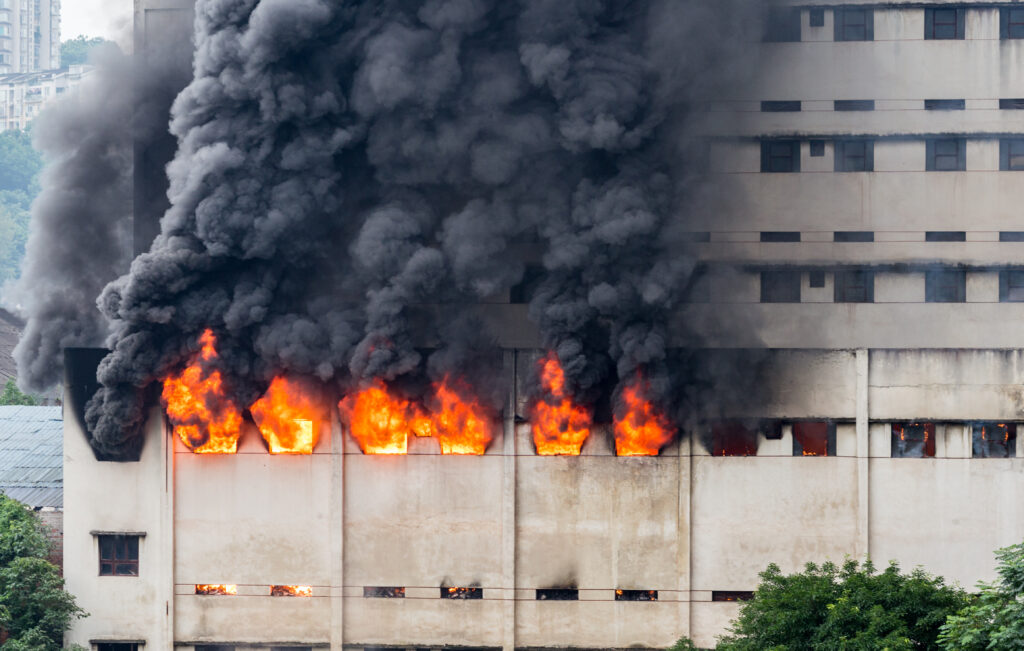
Mechanical Engineers Are the Future of Smoke Control Engineering
The field of smoke control engineering stands at a pivotal moment, and mechanical engineers are poised to lead its transformation. As smoke is the true “killer” in building fires, mastering smoke control systems has become an essential element in safeguarding lives.
My mission is to equip mechanical engineers worldwide with a deeper understanding of smoke control systems through online education and practical tools, empowering them to collectively enhance building safety globally.
I believe smoke control systems should no longer be considered the sole expertise of fire protection and life safety specialists, as smoke control systems are closely connected to the core principles of mechanical and HVAC engineering. I aim to help other mechanical engineers “claim” smoke control as part of their own discipline. By deepening their understanding of life safety fundamentals, I believe mechanical engineers can significantly enhance building safety through better smoke control system design, analysis, and commissioning.
3 Philosophies to Shape the Future of Smoke Control Engineering
- Smoke Control Systems are Mechanical Systems: Active smoke control systems are, at their core, mechanical systems used for life safety purposes. The same principles that guide fan design, ductwork design, damper selection, and airflow dynamics are the ones that can save lives when integrated into smoke control strategies.
- Mechanical Engineers Excel in System Optimization: As building architecture becomes more complex, smoke control designs are increasingly shifting toward performance-based methodologies. Additionally, with the continuous advancement in computing power, even prescriptive smoke control systems are adopting more precise calculation methods, such as fire and egress modeling. Mechanical engineers, with their strong expertise in system optimization, are ideally positioned to drive innovation and enhance these designs.
- Smoke Control Engineering is Interdisciplinary: The future of smoke control will not be driven by any one field. Mechanical, electrical, and fire and life safety engineers must collaborate to create systems that are technically precise and capable of saving lives. The further integration of mechanical engineers into the smoke control discipline can enhance this much-needed collaboration.
Why Mechanical Engineers are Suited for Smoke Control Engineering
HVAC/Mechanical engineers are inherently prepared to tackle smoke control challenges because they already deal with many of the core systems and concepts involved, such as airflow management, and pressurization. If their background is combined with a newfound focus on life safety objectives, mechanical engineers would be ideal candidates to lead smoke control innovation.
Just like electrical engineers have historically brought valuable insight into the fire detection and alarm discipline, mechanical engineers can bring valuable and nuanced perspectives to the smoke control discipline.
Mechanical Engineers Transitioning into Fire and Life Safety (FLS) Engineering
There is a growing interest among mechanical engineers to transition into the fire and life safety industry. Smoke control systems could be one path for individuals looking to make that transition.
- Desire to Design Life-Saving Systems: Many mechanical engineers are motivated by the idea that their work can have a direct impact on the safety of building occupants. Smoke control provides a perfect outlet for that passion.
- Overcoming HVAC Engineering Saturation: The HVAC engineeering field is more saturated than the fire and life safety engineering field. By specializing in smoke control, mechanical engineers can distinguish themselves in an area that is not only in high demand but also critically important.
- Smoke Control is a Natural Path for HVAC Engineers: Smoke control lies at the crossroads of HVAC design and fire safety. For engineers with an HVAC background, it’s an ideal opportunity to apply their expertise while transitioning into a life-saving role. From this foundation, mechanical engineers can also expand their knowledge and advance further into the broader fire and life safety field if they choose.
Why Smoke Control Engineering is Professionally Rewarding
Smoke control engineering offers numerous exciting opportunities for mechanical engineers to advance their careers. Some of the most engaging aspects include:
- CFD and Egress Modeling: Computational Fluid Dynamics (CFD) modeling is an advanced tool that enables engineers to simulate smoke movement and assess system performance under various conditions. Similarly, egress modeling simulates occupant movement during an emergency, helping to evaluate how efficiently people can evacuate a building. It plays a key role in determining whether a smoke control system is effective enough to allow occupants to escape before smoke conditions become untenable. These innovative tools offer a high-tech, problem-solving approach to designing safer buildings.
- Testing and Inspections: Smoke control systems require rigorous testing and inspections, giving engineers hands-on experience with critical projects. This direct involvement ensures the systems perform reliably and enhances building safety.
- Global Demand for Large-Scale Systems: Smoke control systems are in high demand, especially in large-scale projects like high-rise buildings, airports, and commercial centers. This opens doors for mechanical engineers to work on prominent, high-impact projects worldwide.
- Performance-Based Design Innovation: The shift toward performance-based design methodologies allows engineers to apply creative and flexible approaches to system design, beyond traditional code requirements.
- Interdisciplinary Collaboration: Smoke control projects often require close collaboration with architects, fire protection engineers, and building developers, providing mechanical engineers with valuable cross-disciplinary teamwork experience.
- Cutting-Edge Technologies: The growing use of advanced software and simulation tools in smoke control engineering allows for precise system analysis, optimization, and continual technological advancement.
- Life-Saving Impact: Smoke control systems play a crucial role in life safety during fire emergencies, offering engineers the unique opportunity to design systems that can save lives and make a tangible difference in occupant safety.
- Global Demand for Smoke Control Engineering: Smoke control engineers are in high demand worldwide, particularly in countries where rapid infrastructure development requires advanced life safety systems. This provides engineers with opportunities to work internationally on major projects and ensure the safety of large populations.
- Consistent Technical Standards Across Countries: The technical principles of smoke control systems are consistent globally, allowing engineers to apply their expertise in different countries with minimal retraining. This makes smoke control a versatile and transferable field for those seeking international opportunities.
These factors make smoke control engineering a dynamic, impactful, and gratifying field for mechanical engineers.
Current Gaps in Mechanical Engineers’ Understanding of Smoke Control Systems
While mechanical engineers are well-equipped to expand their expertise to include smoke control systems, there are generally some gaps in their current understanding that need to be bridged. These include:
- Fire Dynamics, Design Fires, and Smoke Behavior: While HVAC engineers understand airflow, they may not be familiar with how smoke behaves in a fire, how design fires are calculated, and how smoke dynamics affect safety.
- Fundamental Objectives of Smoke Control Systems: Mechanical engineers may not fully grasp the primary life safety objectives behind smoke control systems.
- Fire and Life Safety Fundamentals: Smoke control systems need to be designed with a life safety mindset, including considerations for egress, occupant protection, and fire service access.
- Performance-Based Design Methodology: Many HVAC engineers are familiar with prescriptive codes but may not be experienced with the more flexible, yet complex, performance-based design approaches that are becoming increasingly popular in smoke control engineering.
Action Steps for Mechanical Engineers Interested in Smoke Control Engineering
Action #1: Do Background Research on the Fire and Life Safety Engineering Field
Here are some resources to get an overview of the fire and life safety engineering industry:
- https://www.nfpa.org/for-professionals/career-growth/fire-protection-engineer

- https://www.sfpe.org/advocacy-qualifications/core-competencies/fperoles

- https://www.nfpa.org/about-nfpa/nfpa-fire-and-life-safety-ecosystem

Action #2: Check Out My Self-Study Plan for Smoke Control Systems
Check out my post that outlines a recommended self-study plan for smoke control system mastery.
Action #3: Pursue Fire and Life Safety Professional Credentials
To advance in the field of Fire and Life Safety (FLS) and achieve long-term career success, pursuing key certifications and professional development opportunities is essential.
- NCEES – Fundamentals of Engineering (FE) Exam
- The FE exam is the essential first step toward becoming a Licensed Professional Engineer, providing the foundational credential needed to unlock higher-level opportunities in engineering.
- FE Exam Information

- Certified Fire Protection Specialist (CFPS)
- Earning the CFPS certification demonstrates specialized knowledge in fire protection and life safety, enhancing your credibility and career prospects in this high-demand field.
- CFPS Information
- NCEES – Principles of Engineering (PE) Exam – Fire Protection Discipline
- Passing the PE exam is the final step to becoming a licensed engineer, significantly increasing your professional standing and opening doors to leadership roles in fire protection engineering.
- PE Exam Information
- Online Master’s Degree in Fire Protection Engineering
- While not mandatory with a PE license, a master’s degree can add valuable expertise, allowing you to pursue advanced roles in research, academia, or specialized industry positions.
- Part-time study is possible while working, depending on family commitments.
- It’s advisable to request financial support from your company for tuition.
Action #4: Subscribe to the NoonFire Blog Newsletter and Follow on LinkedIn
Click this link to subscribe to the NoonFire Blog newsletter to stay updated with my latest insights, tools, and educational resources in smoke control engineering.
to stay updated with my latest insights, tools, and educational resources in smoke control engineering.
Click this link to follow NoonFire Blog on LinkedIn to stay informed and advance your understanding of this rapidly evolving field of smoke control engineering. Don’t miss out on content designed to enhance your knowledge and career growth.
to stay informed and advance your understanding of this rapidly evolving field of smoke control engineering. Don’t miss out on content designed to enhance your knowledge and career growth.
Conclusion: Mechanical Engineers Are the Future of Smoke Control Engineering
By expanding their expertise into the smoke control engineering discipline, mechanical engineers can make a tangible difference in building safety. Their deep understanding of HVAC systems, when combined with life safety principles, positions them as the ideal candidates to revolutionize smoke control design, analysis, and commissioning. Through specialized education, practical tools, and a clear path into fire and life safety, mechanical engineers will not only transform their careers but also transform the future of building safety.
